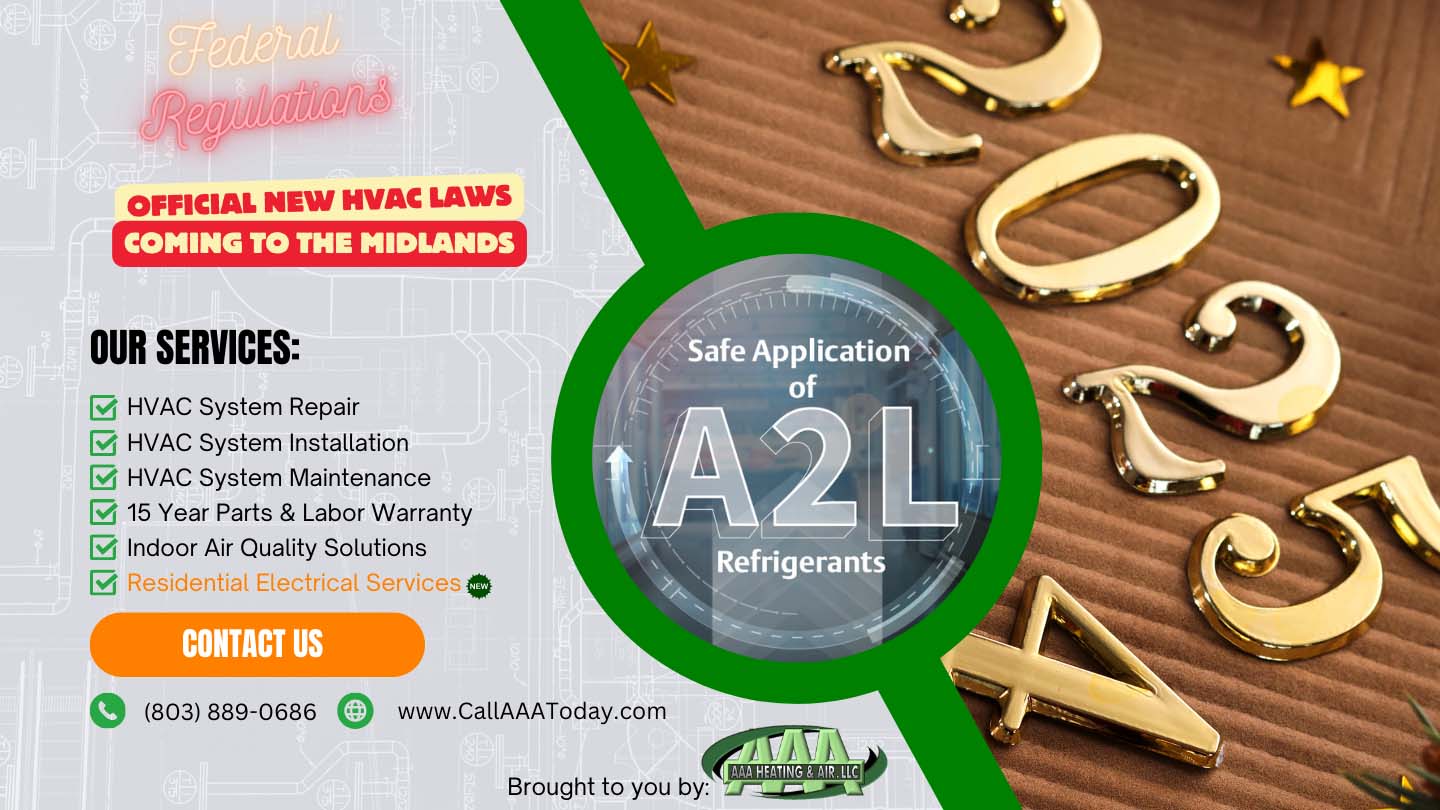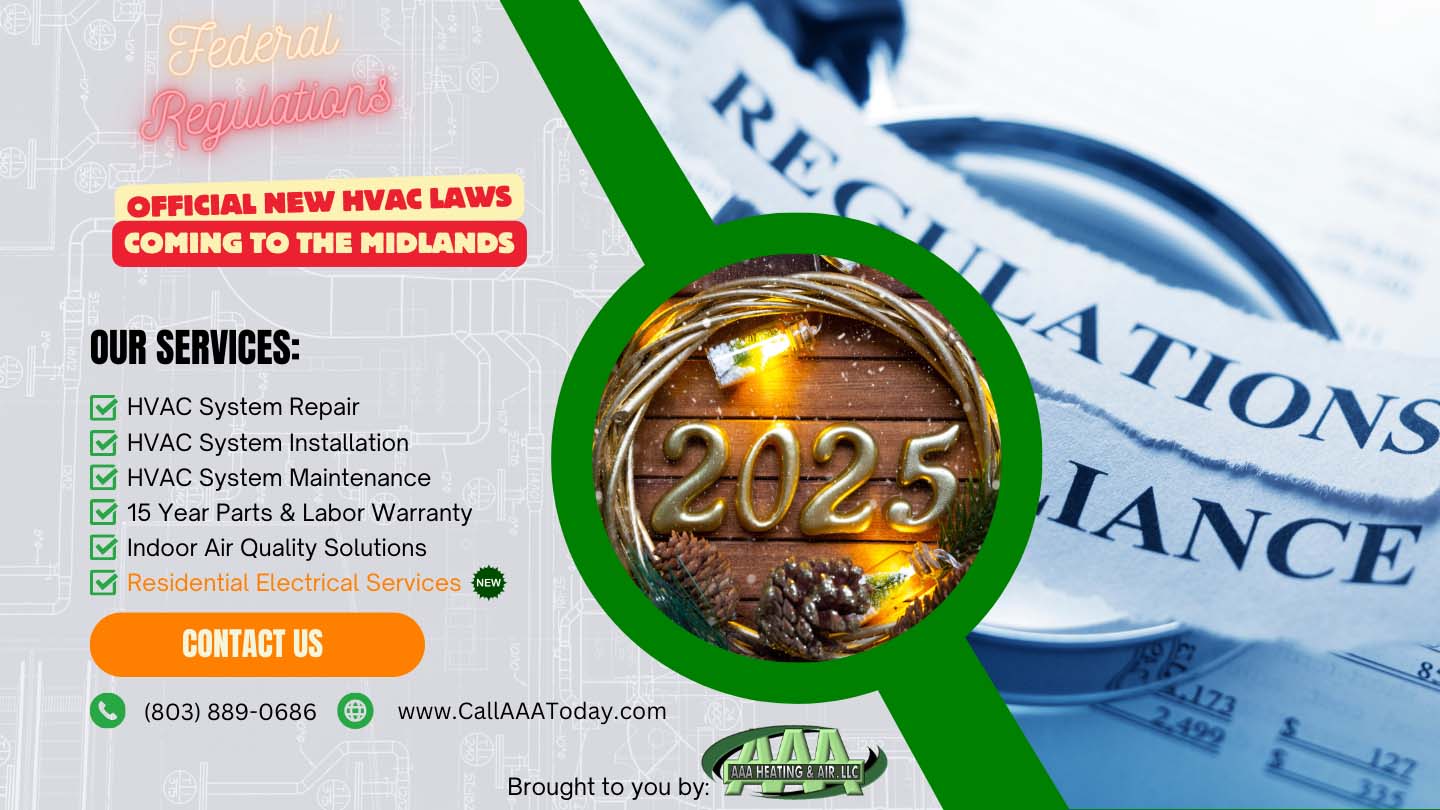New HVAC Laws Coming: Preparing for the Future in the Midlands of South Carolina
As we embrace the changing seasons in the Midlands of South Carolina, it’s also time to consider the evolving landscape of HVAC technology. With new HVAC laws coming on the horizon, updating your HVAC system isn’t just about comfort; it’s about compliance and sustainability.
Understanding the 2025 Refrigerant Transition
Overview of New Regulations: The American Innovation and Manufacturing Act of 2020 marks a significant shift in HVAC technology. By 2025, the use of high Global Warming Potential (GWP) refrigerants like R-410A will be phased out in favor of lower GWP alternatives, primarily A2L refrigerants such as R-454B and R-32. This change is part of a global effort to combat climate change by reducing greenhouse gas emissions.
Why the Change: The phase-down of hydrofluorocarbons (HFCs) is crucial. These chemicals, while effective as refrigerants, have a high GWP, meaning they contribute significantly to global warming when released into the atmosphere. By transitioning to A2L refrigerants, we’re not only complying with new HVAC laws coming but also playing our part in environmental conservation.
What Are A2L Refrigerants?
Definition and Characteristics: A2L refrigerants are classified as mildly flammable, which is a departure from the non-flammable refrigerants used previously. They offer better energy efficiency and lower environmental impact. However, their flammability necessitates new safety protocols.
Safety Considerations: Due to their flammable nature, A2L refrigerants require specific installation practices, including enhanced ventilation and possibly different equipment designs. Additionally, leak detection systems are becoming standard to ensure safety.
Preparing Your HVAC System for New HVAC Laws Coming
Check Compatibility: Not all systems can be retrofitted to use A2L refrigerants. Homeowners should consult with HVAC professionals to determine if their current system can be adapted or if a replacement is necessary.
Maintenance Checklist:
- Inspection: Regular checks for leaks, ensuring insulation integrity, and verifying that all system components are compatible with new refrigerants due to new HVAC laws coming are essential.
- Upgrade or Replace: If your system is old or not compatible, consider upgrading. Newer systems not only comply with new HVAC laws coming but often come with energy-saving features.
- Certification: It’s crucial that any work on your HVAC system is done by technicians certified to handle A2L refrigerants, ensuring safety and compliance.
Benefits of Switching to A2L Refrigerants
Environmental Impact: The switch to A2L refrigerants significantly reduces the carbon footprint of HVAC systems, contributing to global efforts against climate change.
Long-term Savings: While there might be an initial investment, A2L systems promise lower operational costs due to their energy efficiency, leading to savings over time.
The Role of Professionals in the Transition
Why Professional Service is Crucial: The complexity of handling A2L refrigerants means professional installation and maintenance are not just recommended but necessary. Incorrect handling can lead to safety hazards.
Training and Certification: HVAC professionals now require specific training to work with these new refrigerants, ensuring they can handle the systems safely and effectively.
Future Outlook for New HVAC Laws Coming
Innovation in Refrigerants: Beyond A2L, the future might see the adoption of even more environmentally friendly solutions like CO2 systems, reflecting ongoing innovation in the field.
Consumer Trends: There’s a growing demand for eco-friendly solutions. This trend is likely to influence future HVAC technologies, pushing for even more sustainable options.
Adapting to new HVAC laws coming is not just about compliance; it’s about embracing technology that supports our planet’s health while ensuring our comfort. By staying ahead of these changes, you contribute to a sustainable future.
Don’t wait for the last minute. Schedule your professional HVAC check-up or consultation with AAA Heating & Air today. Call (803) 889-0686 or click HERE to take the first step towards a more efficient, compliant, and comfortable home environment.

Written by: Jared M. Sewell

